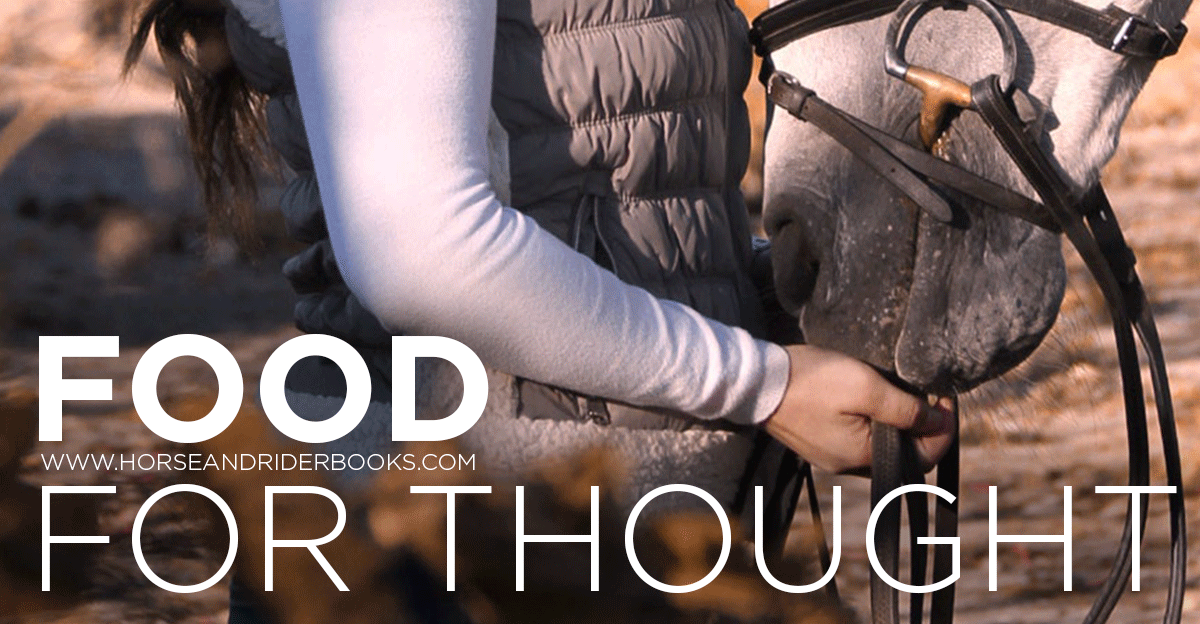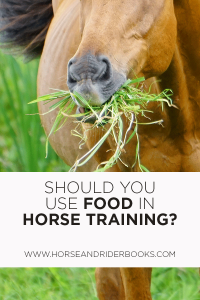
Sugar cubes. Peppermints. Carrots. Carefully sliced pieces of apple. “Cookies.” Admit it: We all have one. A favorite treat.
When your horse comes trotting up in the pasture, it feels good, right? When he turns and looks over his shoulder after a square halt, your heart melts a little. When he walks, trots, and stays right at your side in the round pen or arena, all sans halter and lead rope, you feel like you’re on top of the world.
Was it just the “cookies” that made him do it?
Do you know?
In their book EQUUS LOST? ethologists Francesco De Giorgio and José De Giorgio-Schoorl argue that science says using treats to train a horse—or any animal—is a bad idea, and we should all take our hands out of the goody bag. Here’s what they say:
In today’s social media, there are countless examples of situations where food rewards are used in interaction with all kinds of animals. Dolphins, dogs, horses, cats, rabbits, zebras, tigers, and many others undergo this kind of conditioning. It might look innocent, but it has a direct impact on their limbic system (comprised of brain structures that are involved in emotions).
 We can understand the severity of this impact by looking, for example, at the importance of the senses for horses, for their well-being in general and, more specifically, in their interaction with humans. If we want to improve our understanding of horses and our interaction with them, we need to be aware of how they create their own experience and leave the horse the freedom to do so.
We can understand the severity of this impact by looking, for example, at the importance of the senses for horses, for their well-being in general and, more specifically, in their interaction with humans. If we want to improve our understanding of horses and our interaction with them, we need to be aware of how they create their own experience and leave the horse the freedom to do so.
It’s in the Nose
Horses use their olfactory system to process information coming from odors. They explore and smell in order to be connected with their environment and improve their understanding of it. For this reason, when working with horses, we must learn to be aware of how the horse uses his senses, trying to notice and understand when the horse is interested or focusing on something with his senses. It could be anything! Something on the ground, a fence, something in the air….
Some horses (like many humans!) are no longer used to using their sense of smell to improve their understanding of a situation, and as a result, miss important information that could otherwise be reassuring. This “not smelling” is due to constantly overlooking their needs in their interaction with man. When they want to stop to smell along a path, we ask them to continue walking; when they want to take in the smells of an unknown arena, we ask them to start “working,” for example.
This problem is accentuated further if horses get used to food premium rewards. By being trained to focus on food, their response is stimulated in the limbic system, and the possibility of remaining calm and explorative is almost entirely taken away. They create a strong association between anything interesting to explore and the possibility of food. Of course, the olfactory system is still working, but from a reactive inner state, with the expectation of finding food, instead of simply processing information from an object. A horse that is smelling with food expectations is easily recognizable: his nostrils pass quickly and mechanically without taking in his surroundings, his breath is superficial, and his nose immediately touches a human’s arm or object without first pausing to elaborate the information from a distance or, after slow intense breathing, stopping at a whisker’s distance, taking in all that the moment is telling his perception, to take time to build his own map of the situation. We are not used to paying attention to these kinds of details. We might never know what information the horse is getting, but we can learn to recognize his attention and signs of his elaboration.
Food premiums also have an immediate impact on daily activities. For example, when horses in shared pastures start perceiving man as mere food dispensers, the human presence will immediately trigger food expectations and, consequently, tension in the entire group. This is something we need to take responsibility for instead of trying to correct the behavioral consequences (horses become insistent or even irritated when looking for food), which we caused by using food premiums in the first place.
Can’t Buy Me Love
We often feel the urge to reward because we forget how to live in the moment. The reward becomes a substitute for actually sharing an experience born from an intrinsic interest. Yet, it is from that interest that an authentic relationship can be developed.
Living a calm, interesting life doesn’t need a premium. Life itself should give satisfaction. We live often totally unconnected with ourselves, trying frantically to find contact with the horse, using all kinds of techniques. By offering a premium, we don’t give the horse the possibility to relate to us, congruent and in line with himself.
 We need to be aware of the fact that when we give food rewards to horses, we create such a strong magnet that we reduce their ability for free expression. Positive reinforcement is a form of operant conditioning that falls within the behaviorist framework. Today, it is high time for such an approach to human interaction with animals to be thoroughly questioned. Behaviorism completely disregards animals’ mental elaboration, emotions, and internal state.
We need to be aware of the fact that when we give food rewards to horses, we create such a strong magnet that we reduce their ability for free expression. Positive reinforcement is a form of operant conditioning that falls within the behaviorist framework. Today, it is high time for such an approach to human interaction with animals to be thoroughly questioned. Behaviorism completely disregards animals’ mental elaboration, emotions, and internal state.
Want to know more? EQUUS LOST? by Francesco De Giorgio & José De Giorgio-Schoorl is available from the TSB online bookstore, where shipping in the US is FREE.
CLICK HERE to download a free chapter or to order.
Trafalgar Square Books, the leading publisher of equestrian books and videos, is a small business based on a farm in rural Vermont.

